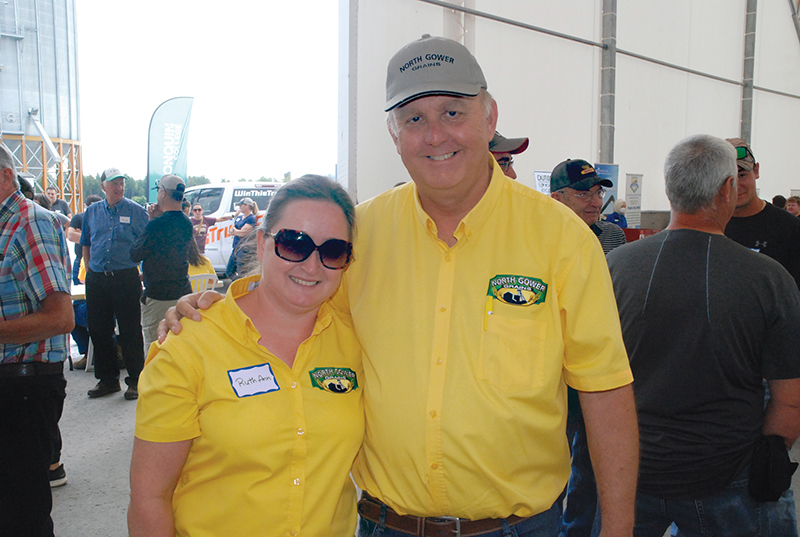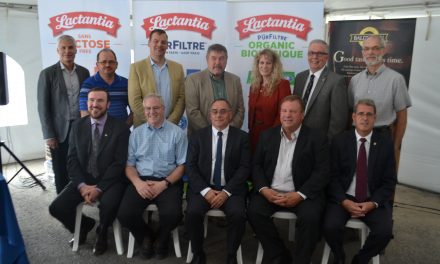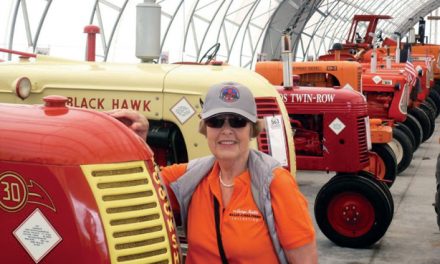Ruth Ann and Dwight Foster, owners of North Gower Grains, celebrated 15 years in business along with hosting their annual customer appreciation day on June 29. Morin Photo
NORTH GOWER GRAINS – North Gower Grains held their first post pandemic customer appreciation day on Wed., June 29.
North Gower Grains is a family owned and operated grain elevator. They handle wheat, soybeans and corn and offer competitive storage rates, flat pricing, and basis contracts, forward pricing contracts and delayed pricing contracts.
The family celebrated 15 years in business as a major destination for local grain in the area.
It had been two years since local grain producers and their families were able to get together to socialize and talk shop while at the same time appreciating North Gower Grains for what they do in their community.
The customer appreciation day worked both ways for North Gower Grains owners Dwight and Ruth Ann Foster who had the opportunity after the pandemic to connect with their many customers who are also their neighbours.
The afternoon featured a lunch, vendors who had come out to the event to raise awareness about their products, a performance of O Canada by the Grenville 4-H Beef Club and a presentation by various sectors of the grain industry about what this year is expected to bring in terms of healthy crops.
Visitors to the event chatted about their farm equipment, work politics and how nice it was to be able to get together with their friends and neighbours.
The event was an opportunity for Dwight and Ruth Ann to remember how they began the journey that would bring them and their family to this particular afternoon.
“In the first year we built our first grain elevator,” said Dwight.
Dwight told the crowd at the event, “Now Ruth Ann and I are looking forward to many more years of continued success for you and for us.”
He had a tractor parked beside the stage he had erected for the occasion and from which all of the presentations were made.
“This is a model of the tractor that I started with when I was a little boy. This was the first tractor I got to drive. It is an old tractor by any standard today. It has no technology on it.”
He remembered when his father told him when he was a young boy that he would not see as many changes in farming as he had.
“I have to say I am not sure he was right. I have seen a lot of changes in my lifetime. For the most part it has been good. The ability to do more with less. We have been able to embrace new technology.”
He acknowledged the different vendors around the shed who were there for the event and said that North Gower Grains’ success was dependent on all of the contributions and technology of those agricultural companies that help farmers and processors.
The decision made by the Fosters to get into the grain storage and processing business happened the year Ruth and Dwight had to leave 400 acres unharvested because there were no local storage facilities that could handle their crop. That was in 2008. Since then, the Fosters have never looked back as their family business has become a permanent fixture in the region with their children becoming fully involved in its management and operation.
Dwight said, while watching all of the farmers and their families chatting in the large equipment shed that had been converted into a dining hall, “This is what farmers love to do.” All around him were men and women talking about the weather, this year’s crop and the latest bit of farming news.
North Gower Grains has made the best of forming positive relationships with various sectors of their agricultural community. One sector is education in the form of a relationship with Algonquin College in Ottawa and Perth.
Martin Savard, professor and coordinator, Business – Agriculture Program with the college, addressed the more than 300 people at the appreciation day event.
Farmers offer up their farms as a real life classroom for the students at the college, giving students in the agricultural program much needed exposure to a farming lifestyle. The college does not have its own real life component in the form of a farming operation for its various programs.
He said the farming community helps in a variety of ways.
“We need expertise and give students experience and having students see how farms are run. Because we do not have a farm on campus we rely on the farming community to help us out. We take the students to see the latest and greatest technology.”
The Algonquin agricultural program offers more than 25 related courses, including agronomy, stock production and livestock management courses. There are a lot of business courses and they are targeted toward farm management and related services to the agricultural industry.”
Algonquin College held a special raffle at the North Gower Grains event for a 2022 GMC Sierra Elevation Crew Cab 4×4 truck. The winning ticket will be drawn at the Carp Fair on Sept. 25 at 2 p.m.
“It is amazing how much support we have had,” said Savard.
Also, presenters at the event were several experts on crop production.
Paul Sullivan of PT Sullivan Agro from Kinburn Ont. spoke to the crowd, saying, “The corn crop is quite advanced for the time of year. It is in very good condition right now. The soil conditions worked up very well in the spring. We had some heat and some moderate moisture conditions. There are pretty good stands of corn out there.”
He had a corn plant, planted in May, that he had brought in from the field to show people its well developed root system.
“The plant growth is a combination of the weather, of the management of it, how it is planted, and the depth it is planted as well as the genetics of the plant,” he said.
The 4-H movement was represented at the gathering. Members of the Grenville, Lanark, and Ashton 4-H clubs sang “O’Canada” to begin the festivities.
Alysa Mowat, a 2021 graduate of the Algonquin Agricultural Business program, a member of the Ashton 4-H club, and one of the 4-H members who came to the event to sing “O’Canada”, was there.
She enjoyed the Algonquin program, saying, “In the course we learned everything from running your own farm to how agronomy works in general.”
The students in the course had the opportunity to have a look at different aspects of the agricultural industry.
Mowat explained that having both an agricultural education experience along with the business side of agriculture was important to her.













